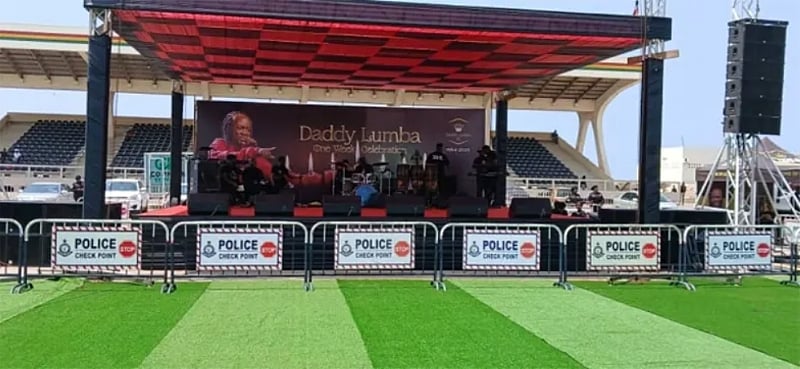The passing of highlife legend Daddy Lumba on July 26, 2024, at the age of 60, cast a pall of grief across Ghana. A week later, thousands of mourners, a testament to his profound impact on the nation, converged upon Independence Square in Accra to commemorate his life and musical legacy. The memorial, initially planned for the University of Ghana Stadium, was relocated to Independence Square due to a noise-making ban imposed within the La Traditional Area, highlighting the respect accorded to local customs even amidst national mourning. The change in venue did little to dampen the outpouring of grief and celebration of Lumba’s life. The atmosphere was charged with emotion, a blend of sorrow for his loss and joyous remembrance of his enduring musical contributions.
Born Charles Kwadwo Fosu on September 29, 1964, in Nsuta, Ashanti Region, Daddy Lumba’s journey from humble beginnings to musical icon is a narrative deeply intertwined with the evolution of Ghanaian highlife. His death at The Bank Hospital in Accra marked the end of an era, leaving a void in the hearts of millions who found solace, joy, and cultural identity in his music. The memorial service, a collaborative effort between the Creative Arts Agency and the Fosu family, served as a poignant tribute to his profound influence on Ghanaian society and the music industry. The air was filled with the resonant melodies of his timeless hits, including “Theresa,” “Makra Mo,” “Aben Wo Ha,” and “Sika Asem,” each song a poignant reminder of his lyrical genius and musical mastery. These familiar tunes resonated with the mourners, stirring memories and emotions that underscored the depth of his connection with his audience.
The memorial attracted a diverse array of attendees, reflecting the breadth of Daddy Lumba’s influence. Dignitaries from the political sphere, including former President Nana Addo Dankwa Akufo-Addo and former Vice President Dr. Mahamudu Bawumia, graced the occasion, paying their respects to a national icon. Their presence underscored the recognition of Lumba’s contributions not just to music but to the nation’s cultural fabric. Former Energy Minister, Dr. Matthew Opoku Prempeh, NPP flagbearer hopeful Kennedy Agyapong, and former National Lottery Authority boss Sammy Awuku were also among the prominent figures present, highlighting the cross-party appreciation for Lumba’s work. The gathering transcended political divides, uniting Ghanaians in their shared grief and admiration for the departed artist.
The creative arts community turned out in force, demonstrating the deep respect and affection held for Daddy Lumba within the industry. Veteran musicians like Amakye Dede and Pat Thomas, who witnessed and participated in the evolution of highlife alongside Lumba, were present to honor their peer. Contemporary stars such as Sarkodie and Gyakie, whose music has been influenced by Lumba’s legacy, paid tribute to the man who paved the way for their success. The presence of a wide spectrum of artists, from gospel singer Obaapa Christy to actress Emelia Brobbey, and personalities like Akuapem Poloo, Andy Dosty, DJ Mensah, and Serwaa Amihere, showcased the far-reaching impact of Lumba’s artistry across various entertainment sectors. This intergenerational gathering of artists symbolized the continuity of musical tradition and the lasting impact of Lumba’s influence on Ghanaian music.
The memorial service at Independence Square marked only the beginning of a series of planned events to celebrate Daddy Lumba’s life and work. The week-long observance served as an initial opportunity for the nation to collectively mourn and reflect on his contributions. While the final funeral arrangements are yet to be officially announced, it is expected that the culminating ceremonies will take place in Kumasi, Ashanti Region, bringing him back to the land of his birth for his final rest. The upcoming funeral rites will undoubtedly draw even larger crowds, as fans and admirers from across the nation and beyond gather to bid farewell to a musical giant.
Daddy Lumba’s legacy transcends mere musical accomplishment. He was a cultural touchstone, a storyteller who captured the essence of Ghanaian life in his lyrics, and a musical innovator who fused traditional highlife rhythms with contemporary sounds. His music served as a soundtrack to lives, resonating with generations of Ghanaians. The outpouring of grief and the numerous tributes from across society following his passing underscore the profound and lasting impact of Daddy Lumba’s contributions to Ghanaian music and culture. He will be remembered not only for his prolific musical output but also for the joy, solace, and cultural identity he gifted to his nation.


